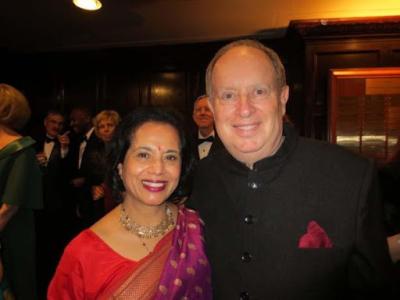
Upon graduating from Ohio State (journalism, ‘61) and then from Columbia University’s Graduate School of Journalism (MS, ‘62), Myron Belkind dedicated his life to journalism for more than 40 years, working for The Associated Press and now inspiring the next generation of journalists at George Washington University.
“Responsibility, accuracy and fairness. That gives journalists the one thing that enables them to practice journalism: credibility,” said Belkind. “We are allowed to practice journalism only as long as we have credibility. That's what I have tried to instill in my students.”
Belkind’s passion for teaching what good journalism represents is his primary goal. His experiences allow him to incorporate unique perspectives into his lessons.
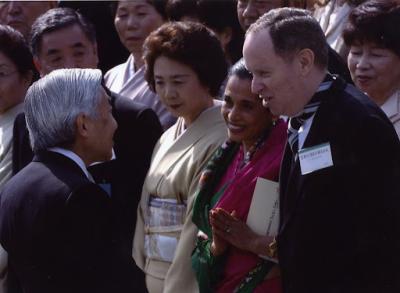
Before retiring in 2005 from The Associated Press, Belkind transferred to the Tokyo AP Bureau to finish where he began his foreign correspondent career over 40 years ago: in Asia. On his last day, he and his wife, Rachel, attended the annual sakura, or cherry blossom, reception hosted by Japanese Emperor Akihito and Empress Michiko at the Imperial Palace.
“Normally, guests do not speak with the royals. However, the Empress stopped to say hello, and I said we were honored to spend the final day of our AP life at the sakura reception,” Belkind said.
Belkind was also the bureau chief at the London AP Bureau for 21 years (preceded by three years as assistant chief of the bureau) before moving to Tokyo. He covered four British prime minister administrations (including Margaret Thatcher’s), the royal family from the wedding of Prince Charles and Lady Diana in 1981 to her death in 1997 and the conflicts between the British and the Irish Republican Army.
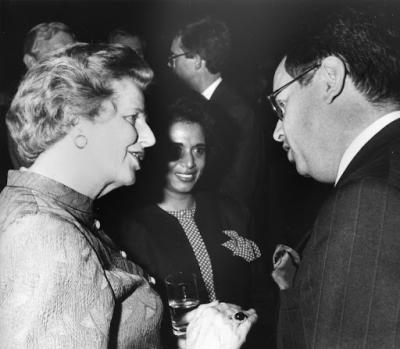
While in London, Belkind and his son Joshua reported on an Irish Republican Army bombing that took place in 1992 near their residence. Joshua Belkind captured a clear photo of the explosion site from the roof of a neighboring building in the dark of night and Myron Belkind wrote an article covering the event.
“The next day, Joshua had a byline on the photo and I had the byline on the story,” Belkind said. “He has the front page framed in his office in Los Angeles. So a very proud moment indeed.”
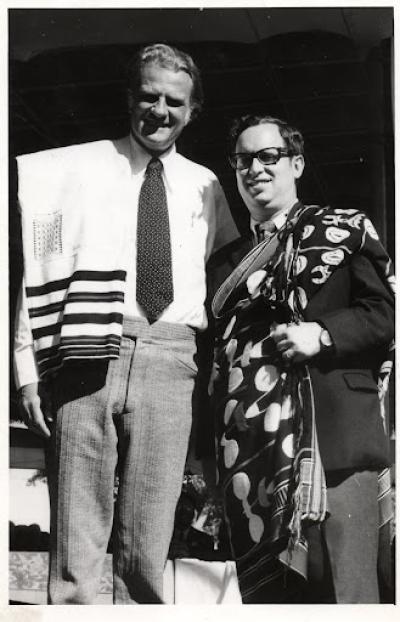
Belkind’s experience also includes 10 years spent in India covering events like the Baptist missionary trip with the Rev. Billy Graham in 1972 to Nagaland in the remote northeastern region of the country. As the only American correspondent, Belkind had an exclusive view into Graham’s life.
“It was agreed that I would have breakfast with Reverend Graham every day so he could let me know what his lesson would be that night. All my experiences were memorable, but that was particularly memorable,” said Belkind.
Another historical event Belkind covered was the overnight transformation of India from the
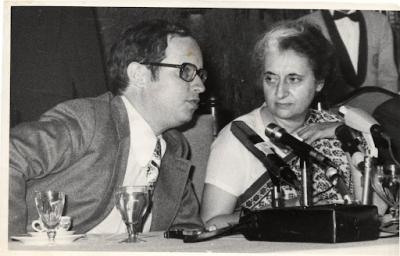
world's largest democracy to authoritarian rule due to Prime Minister Indira Gandhi’s state of emergency declaration in 1975. With the creation of the office of the chief censor, Belkind met with the chief censor to discuss concerns over potential false rumors about Pakistan and Indian relations.
Belkind told the chief censor, “If I ever publish a story based on false rumors, the Indian government will expel me and The Associated Press will fire me.”
Belkind’s AP assignment to India occurred after he spent more than a year as an Army draftee. Working as an information specialist, he wrote press releases for the U.S. Military Assistance Command in Saigon, Vietnam. Before being drafted, Belkind received a Pulitzer Traveling Fellowship from Columbia that he used to report from Southeast Asia while based in Malaysia for a year.
Originally from Cleveland, Belkind credits his junior high mentor, Doris Govan, an English and social studies teacher and the school's newspaper faculty adviser, for sparking his interest in journalism. Her guidance drove him to work on the junior high school newspaper, which helped him realize his passion for journalism.
“It's just an otherworldly experience to be this kid from Cleveland who grew up meeting all these amazing people. When I would meet these world leaders, I was there not as Myron Belkind, the kid from Cleveland. I was there as a journalist representing millions of readers,” said Belkind.
Throughout his career, Belkind has been elected by his peers to lead professional organizations in New Delhi, London, Tokyo and Washington, where he was president of the National Press Club in 2014.
Alongside his career, Belkind enjoys spending time with his wife, two children and two grandchildren. He now lives in Washington, where he focuses on preparing the next generation of journalists. As a lecturer, he also fulfills a lifelong promise he made as a college student.
Belkind’s mentor, George J. Kienzle, the former director of what was then Ohio State’s School of Journalism, made Belkind promise that one day he would teach college students the importance of good journalism, and he fulfills that promise through his current role as a professorial lecturer.
“I tell my class every year, as long as my health is good and the students seem to value what I say and the way I teach and what I teach, I'll keep doing it,” said Belkind, now at age 83.
Article written by student Kobie Parrish
